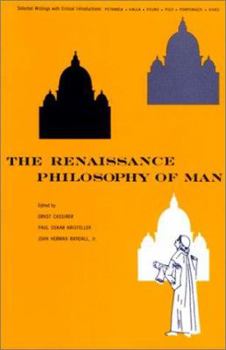The Renaissance Philosophy of Man: Petrarca, Valla, Ficino, Pico, Pomponazzi, Vives
Select Format
Select Condition 
Book Overview
The Renaissance Philosophy Of Man: Petrarca, Valla, Ficino, Pico, Pomponazzi, Vives is a book written by Ernest Cassier that explores the philosophical ideas of six prominent figures during the... This description may be from another edition of this product.
Format:Paperback
Language:English
ISBN:0226096041
ISBN13:9780226096049
Release Date:February 1956
Publisher:University of Chicago Press
Length:413 Pages
Weight:0.90 lbs.
Dimensions:0.8" x 5.3" x 8.0"
Customer Reviews
3 ratings
Wrong Edition
Published by Janice Schick , 11 months ago
I ordered a hardcover and the system made a mistake so I got a soft cover. Now they won’t refund me.
A philosophy of the human person
Published by Thriftbooks.com User , 18 years ago
Renaissance is French for "re-birth." But what, exactly, was reborn? The human person as a rational soul capable of free thought and choice--if we take these Renaissance thinkers seriously. The first 119 pages are devoted to six pieces by poet Francesco Petrarca written in the mid 14th Century. "On His Own Ignorance and that of Many Others" is a wide ranging self defense against a group of Aristotelian attackers who suggested, essentially, that Petrarca's not very bright. You might expect a poet who developed the sonnet form (as Petrarca did in his Canzionere) to speak in a distinctive voice--and he certainly does. Petrarca claims that he's inspired by Cicero, the Roman rhetorician/politician: "You might be astonished, if you did not know me that I can hardly tear myself away from Cicero, so much am I fascinated by this genius. Even now I am carried along by the no longer unfamiliar charm of the subjects he treats . . . Furthermore, he points out the miraculously coherent structure and disposition of body, sense and limbs, and finally reason and sedulous activity." He then engages in a discussion of whether it's better to have a good will or strong intellect (Petrarca himself had both): "It is safer to strive for a good and pious will than for a capable and clear intellect. The object of the will, as it pleases the wise, is to be good; that of the intellect is truth. It is better to will the good than to know the truth. The first is never without merit; the latter can often be polluted with crime and then admits no excuse." Bravo. It's not enough to be "smart." What's impressive here is the focus on how a person should be, what traits and characteristics one ought to adopt to live a virtuous life--with the idea implicit that one has a choice, is master of ones own destiny. There's no "one size fits all" idea of the self nor how to lead a proper life among these thinkers, who include Lorenzo Valla, Giovanni Pico Della Mirandola, Pietro Pompanazzi and Juan Luis Vives. All strive to define the self. We'd never say philosophy of "man" today, as in 1948 when this collection was created by the University of Chicago. The important thing is their recognition of a highly conscious self working on the self--a return to and enlargement upon classical ideas of the person stretching from Plato to St. Augustine. Marsilio Ficino's "Five Questions Concerning the Mind" taken from his Epistolae, Book 2 is a work of genius. Ficino, a neo-Platonist, asks whether the motion of the mind is directed toward a definite end, whether it's a particular or universal end and whether it's obtainable. The universe itself is the end of the soul, and it is entirely infinite, he concludes. Throughout his exhilarating exploration, Ficino isn't held back by dogma or doctrine--he's freely defining how the soul and mind might work on his own terms adapting classical thinking. Renaissance thinkers fly in the face of deterministic ideas. The independent self is thinking th
A Fine Anthology of Key Renaissance Writings
Published by Thriftbooks.com User , 20 years ago
This work attempts to resurface pieces of encrypted Renaissance literature which have unjustly passed out of the philosophical circles of the recent modern world and does so in a fashion which will be quite beneficial for the student of the Italian Renaissance or for well-versed philosophers who have either passed these texts by accident or sheer intent. Of the works displayed here the reader will find Petrarch in all his refined literary grace and splendor; and the inquirer will no doubt be left impressed with his sharp exposition of suggestive ideas. The great Lorenzo Valla also stands out in all his unique vigor, using the courteous method of the dialouge to impart his opinions on free will. Giovanni Pico Della Mirandola, the youthful champion of liberal studies, is found here as well, spinning the artful web-of-a-work, Oration on the Dignity of Man. A small portion of the giant corpus of Marsilio Ficino's works may also be digested: of the Latin scion of Plato's writings his Five Questions Concerning the Mind will only be discovered here. At last, the Aristotelian Pompanazzi's essay concerning immortality and Juan Luis Vives short work, A Fable About a Man, will be found here as well. Overall, the editors and translators should receive a gold-star for their efforts; the great men who wrote these treasured texts also deserve a place of precedence in the hall of histories men of literary and philosophical genius. A lover of literature, classic or contemporary, should come to grips with this compendium of Renaissance texts.







